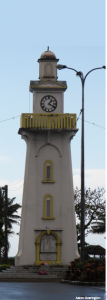IT is not the first time the Samoan prime minister, Tuilaepa Sailele Malielegaoi, has introduced unusual policies for a usual economic objective: enhancing commercial links with important trading partners. Two years ago, Samoan drivers were legally obliged to switch the side of the road they drive on, to make it ‘more economical’ for Samoans to buy cars designed for lefthand driving from Australia and New Zealand, putting their automobile markets in sync. It was characterised by the government as a practical economic move, reflecting the fact that the island of 180,000 is looking increasingly westwards towards Australasia.
The next step, apparently, is time travel. This year, Samoa is hopping westward over the international dateline, skipping the last day of December to align its time more closely with Australia and New Zealand. The island state is respectively 21 and 23 hours behind those countries, meaning that they share only four working days a week. The change will make business with key partners “far, far easier and more convenient”, says Mr Tuilaepa, the first Samoan to earn a masters’ degree in commerce. It isn’t the first time Samoa has had such a temporal transition: 119 years ago, it celebrated the fourth of July twice to shift across the dateline and better accommodate American and European traders. The prime minister points out that “our trading partners have dramatically changed since.”
That is true. Still, not everyone is happy. The local tourism industry is anxious about losing the unique right to boast of Samoa as being the last place in the world to watch the sun set each day. After the change it will become the first place to see the sunrise – a much harder attraction to sell. Comfortingly, and characteristically, Mr Tuilaepa notes that tourists will enjoy the opportunity to celebrate birthdays, weddings and anniversaries twice, by way of an hour-long flight across the dateline between Samoa and neighbouring American Samoa, a US territory. The move also inconveniences some of Samoa’s neighbours. Residents of American Samoa, a close business partner, have expressed annoyance. Tokelau, a fellow Pacific island highly reliant on Samoa, feels obliged to follow it across the dateline. The date change may be a nightmare for cartographers and administrators around the world.
Fortunately, the government is used to controversy: the proposal to switch the side of the road traffic drives on was met with the largest demonstrations in Samoan history and a new opposition party being founded to protest the change. Compared to that, moving the island a day forward seems uncontroversial. That might not be the case for Mr Tuilaepa’s next bright idea.




